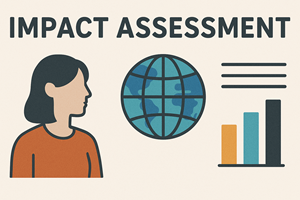
Impact assessment is a structured process for evaluating the potential consequences of a proposed action, considering its implications for people and the environment. It's a systematic way of identifying, predicting, and evaluating the potential effects of a project, policy, or program. Impact assessments can be used at various levels of decision-making, from specific projects to broader policies.
• Identifying potential impacts:
This involves looking at both positive and negative consequences, considering a wide range of factors like environmental, social, economic, and cultural impacts.
• Predicting the nature and magnitude of impacts:
This requires using various methods and models to forecast how the proposed action will affect the environment and people.
• Evaluating the significance of impacts:
This involves determining the importance of the predicted impacts, considering factors like their severity, duration, and reversibility.
• Developing mitigation strategies:
This involves finding ways to reduce or avoid negative impacts and enhance positive impacts.
• Monitoring and evaluating the actual impacts:
This involves tracking the actual effects of the proposed action over time to ensure that the predicted impacts are realized and to identify any unforeseen consequences.
• Environmental impact assessment
• Social impact assessment
• Business impact assessment
• Economic impact assessment
• Human impact assessment
• Corporate Social Responsibility (CSR) Impact assessment
• Skilling/ Training Impact Assessment
© 2024 Pareekshn